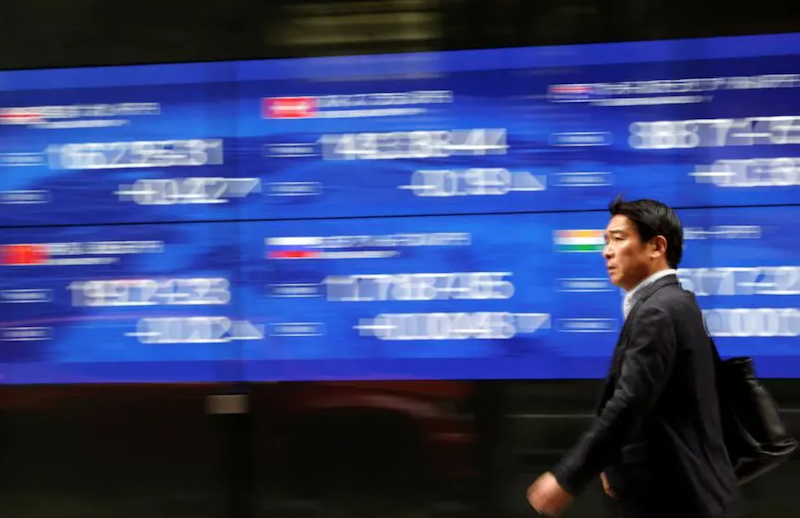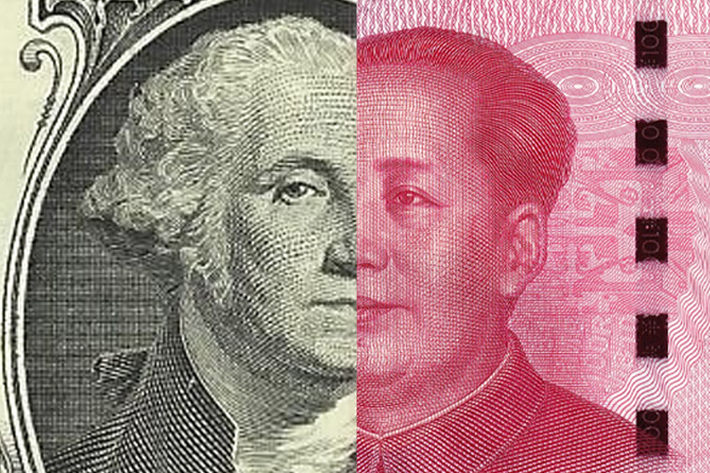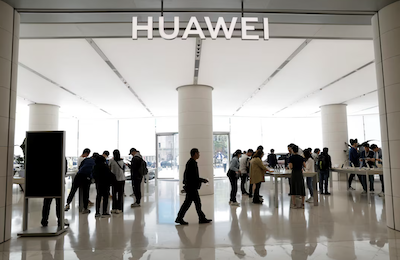Asian shares saw another mixed day to end the last full trading week of the year, with new gaming spending rules by Beijing sending shudders through the tech sector while a Wall Street rally lifted the mood in other corners.
Chinese internet stocks slipped on the regulatory news to drag regional equities down, while the dollar wobbled ahead of US inflation data that’s expected to validate bets on rate cuts in 2024.
Japan’s Nikkei share average booked a second weekly advance, though, helped by an overnight Wall Street rebound after US data offered more evidence of a “soft landing” in the world’s largest economy.
Also on AF: China’s Geely Says Ship Attacks Will Delay EV Arrivals in EU
The Nikkei finished 0.09% higher at 33,169.05, registering a 0.6% rise for the week. The index had climbed 0.71% earlier in the day as chip shares tracked a rally in their US peers but those gains quickly evaporated.
The broader Topix, with its lower concentration of tech shares, gained 0.45%. Its value share subindex added 0.66%, outpacing the growth share subindex’s 0.24% rise.
Nomura Securities strategist Kazuo Kamitani said an optimistic domestic macroeconomic backdrop was also supporting shares.
Hopes for spring wage negotations to bring salary increases that outpace inflation, and for a shift to good inflation from bad inflation, is lifting the Nikkei, he said.
Japan’s core consumer prices rose at their slowest pace in more than a year in a sign of easing cost-push pressures, data showed.
Tencent, Netease Slide
Mainland China stocks slid despite five major state banks cutting interest rates on some deposits, after China issued draft rules for online game management.
The new rules would impose strict curbs on players’ spending as Beijing continues to tighten regulations for the sector. Shares in gaming giant Tencent and Netease slumped 7.2% and 12.2%, respectively, to lead the decline.
The blue-chip CSI 300 Index rose 0.19% but the Shanghai Composite Index dropped 0.13%, or 3.94 points, to 2,914.78. The Shenzhen Composite Index on China’s second exchange fell 0.88%, or 15.86 points, to 1,785.64.
The Hang Seng Index lost 1.69%, or 280.72 points, to end at 16,340.41, and the Hang Seng China Enterprises Index lost 2.33%.
Elsewhere across the region, in earlier trade, Singapore, Wellington, Taipei, Manila, Mumbai and Jakarta all rose but Seoul was down. MSCI’s broadest index of Asia-Pacific shares outside Japan gave up gains to trade 0.3% lower.
US Stocks Bounce Back
Outside Asia, markets have been in a festive mood for weeks as inflation data around the world has showed a slowdown and the Federal Reserve signalled it was done raising interest rates.
Two-year US Treasury yields are down almost 38 basis points in a week and a half and fell 2 bps overnight when third-quarter US core PCE inflation was revised down to 2%.
The data has markets girding for a downside surprise on the last key number before Christmas, November’s personal consumption expenditure index, due at 1330 GMT with consensus expectations for a monthly increase of 0.2%.
Overnight US stocks bounced back from a sudden slide at the end of Wednesday’s session and the S&P 500 rose 1%. The index is within 2% of its record high.
S&P 500 futures dipped 0.1% in Asia and Nike shares slid almost 12% in after-hours trade after the company cut its sales forecast, blaming cautious consumers. European futures were flat.
Yen Year’s Worst G10 Currency
Oil is set for a weekly gain on nervousness about the security of Red Sea shipping, but prices fell overnight after Angola said it would quit OPEC, raising questions about the producer group’s efforts to limit global supply.
Brent crude futures were up 58 cents to $79.97 a barrel in Asia trade on Friday, for a weekly gain of 4.5%.
In currency trade the dollar has come under pressure from markets’ expectation of more than 150 bps of rate cuts in 2024.
At $1.1002 the euro is up 1% this week, even though a similar amount of cuts are priced in for Europe next year. The common currency is also up about 1% against sterling, which fell sharply this week after a surprise dive in inflation.
The dollar index is down 0.7% this week to 101.85. For the year it is down 2.4%. Among G10 currencies the best performer of the year was the Swiss franc, up nearly 8% on the dollar, while the yen’s 7.8% drop made it the worst. The dollar rose marginally to 142.43 yen on Friday.
Gold is set to end the week and the year ahead, with a 12% gain so far this year to $2,049 an ounce. Bitcoin is up 160% this year to $44,114.
Key figures
Tokyo – Nikkei 225 > UP 0.09% at 33,169.05 (close)
Hong Kong – Hang Seng Index < DOWN 1.69% at 16,340.41 (close)
Shanghai – Composite < DOWN 0.13% at 2,914.78 (close)
London – FTSE 100 > UP 0.15% at 7,706.06 (0936 GMT)
New York – Dow > UP 0.87% at 37,404.35 (Thursday close)
- Reuters with additional editing by Sean O’Meara
Read more:
Tencent, Netease Shares Plunge After China Issues Gaming Rules
China Curbs The Export of Rare Earths Processing Technology
Japan Looking to Trim Budget for First Time in 12 Years
Nikkei Follows Wall St Sell-Off, Tech Falls Leave Hang Seng Flat
























